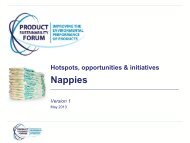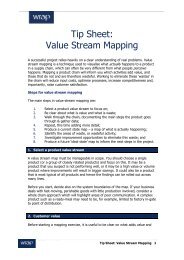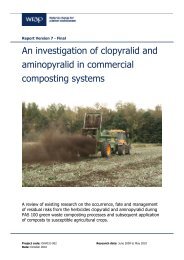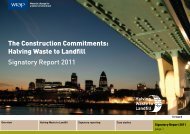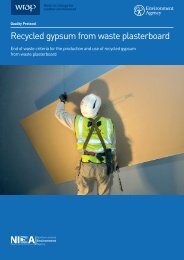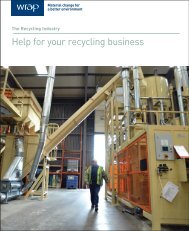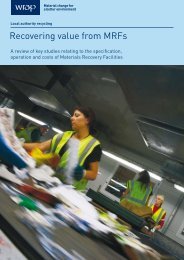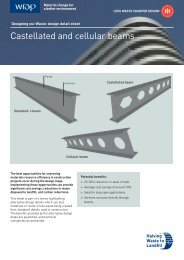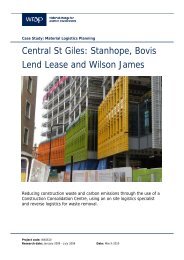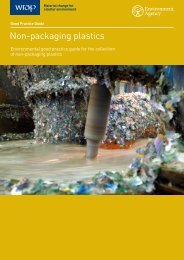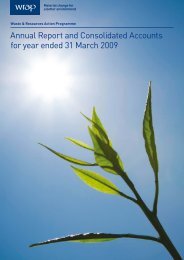Developing a Strategic Approach to Construction Waste
Developing a Strategic Approach to Construction Waste
Developing a Strategic Approach to Construction Waste
Create successful ePaper yourself
Turn your PDF publications into a flip-book with our unique Google optimized e-Paper software.
Restricted – CommercialAEA/ ED02414/Issue 1<strong>Developing</strong> A <strong>Strategic</strong> <strong>Approach</strong> <strong>to</strong> <strong>Construction</strong> <strong>Waste</strong>3 Consultation ReviewAs part of Task 5, a consultation exercise was undertaken, exploring the construction industriesattitudes <strong>to</strong>wards new and existing legislation. 56 large developers, construction companies andplanning organizations within the UKs construction industry were approached and 19 respondentsanswered a short questionnaire. See Appendix 1 and 2 for company contacts and responses.The following section is a SWOT analysis of the questionnaires responses, providing a summary ofthe general feedback, and feedback on current legislation by two councils who have developedSupplementary Planning Documents in order <strong>to</strong> relieve their waste disposal problems and aid wasteminimization at a sub-regional level.3.1 Questionnaire responses3.1.1 Question 1. What waste legislations do you feel affect theconstruction industry?The majority of the respondents were senior environmental management within these largedevelopment and construction companies. They have largely been employed <strong>to</strong> keep up <strong>to</strong> date withconstruction waste legislation in order for the company <strong>to</strong> comply with EU and UK legislation.All of the reported legislations (section 2 of the report) affect the respondents depending on the sitesand waste they are working on or with. However, respondents felt the following legislations have thebiggest affect on their day-<strong>to</strong>-day running:• Environmental Protection (Duty of Care) Regulations 1991• Landfill regulations• Hazardous <strong>Waste</strong> Regulations 2005• Clean Neighborhoods Act• Environmental Liability Directive• <strong>Waste</strong> Management Licensing Regulations 1994• Environmental Protection Act 1990A point of interest from the majority of the respondents was their view on the proposed Site <strong>Waste</strong>Management Plans due for implementation later this year, which they believe will affect them greatly.3.1.2 Question 1a. How do these affect your company i.e. have you had <strong>to</strong>employ an environmental manager; does it require more man days;paperwork; increase costs; landfill gate charges?The majority of development and construction companies have employed specific staff i.e.environmental managers, advisors or support officers. They are generally permanent, but someemploy temporary staff <strong>to</strong> keep the company up-<strong>to</strong>-date with legislative changes. The level ofinteraction ranges from basic legislative updates through <strong>to</strong> writing standard processes andprocedures, developing waste management policies and strategies for all sites, supported by on-sitetraining and guidance notes.There are some large companies that have still not got specific environmental staff and make do bydelegating legislative research <strong>to</strong> general staff or are only now sending staff off for training. However,as stated above, the majority have designated staff and some companies have gone so far as <strong>to</strong>18 AEA Energy & Environment



